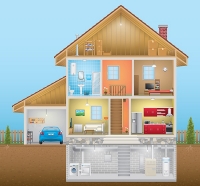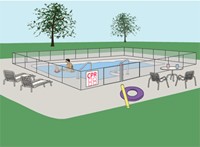Healthy Homes - Pool
Health and safety tips
- Watch young children around water.
- Teach children to swim.
- Teach children about water and pool safety rules.
- Use sunscreen.
- Learn CPR.
- Fence off pool and install a self-latching gate.
- Protect against water illnesses by keeping a clean pool.
- Don't use glass containers in pool area.
Green tip
Use a solar cover on your pool to reduce water loss and evaporation, retain heat and keep your pool clean by preventing debris from falling into it. You will not need to add extra water to your pool as often, run a separate heater to keep your pool water warm or run your pool pump or filter as much. You will also use fewer chemicals and cut the amount of time needed to clean your pool. Preventing water evaporation is especially important, because evaporation is responsible for 70 percent of a pool’s energy loss, according to the U.S. Department of Energy.
What is the best way to get rid of unwanted pool chemicals?
The Tennessee Department of Environment and Conservation conducts mobile household hazardous waste collection events throughout Tennessee each year. Any Tennessee citizen can participate in the mobile household hazardous waste collection service. Check the collection schedule to determine a convenient event for you. Only hazardous waste from households will be accepted. No commercial, institutional or agri-business waste will be accepted. The day of the event, load the unwanted materials into your trunk or the back of your truck. For safety, do not mix materials, keep them in their original containers, double package any leaking containers and place any breakable containers in a box cushioned with newspaper. When you get to the event you will be asked which county you live in and where you learned about the event.
Pool equipment
- Maintain pool and spa covers in good working order.
- Consider using a surface wave or underwater alarm.
- Ensure any pool and spa you use has compliant drains covers. Ask your pool service provider if you do not know.
- Keep safety/life saving equipment on hand and in good condition.
Avoiding recreational water illnesses
- Don’t get into the water if you have diarrhea.
- Don’t swallow water from pools, lakes, rivers or other bodies of water.
- Practice good hygiene. Shower with soap before swimming and wash your hands after using the toilet or changing diapers.
- Take children on frequent bathroom breaks or check diapers often.
- Change diapers in a bathroom or a diaper-changing area, not at poolside.

Additional resources
Centers for Disease Control and Prevention (CDC)
Drowning Prevention
www.cdc.gov/drowning/about/
Healthy Swimming/Recreational Water
www.cdc.gov/healthy-swimming/about/
U.S. Department of Housing and Urban Development (HUD)
Help Yourself to a Healthy Home
www.hud.gov/sites/documents/DOC_11880.PDF
U.S. Consumer Products Safety Commission
Staying Safe in Residential Pools
www.poolsafely.gov/pool-spa-safety/staying-safe-pools-spas/residential-swimming-pools
Tennessee Department of Health (TDH)
Simple Steps to Enjoy Safe Swimming
www.tennessee.gov/news/2010/5/25/follow-simple-steps-to-enjoy-safe-swimming
